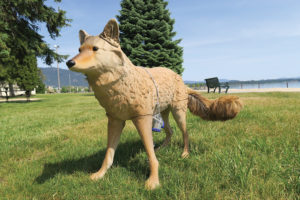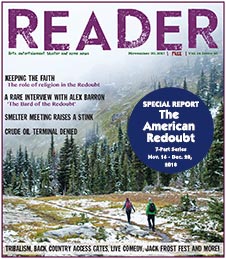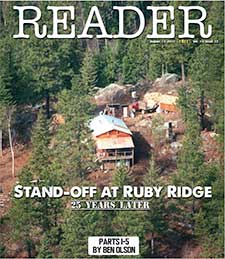Standing Guard
By Ben Olson
Reader Staff
Coyotes at Sandpoint City Beach? Well, sort of.
Sandpoint Parks and Recreation is trying out a new goose deterrent system with the placement of several coyote decoys at the Beach. The decoys were placed on the lawn last week, and according to Parks and Rec. director Kim Woodruff, they are showing positive signs.
“We purchased seven of them, with five or six more coming by Thursday,” said Woodruff. “We’ve seen success in the first week. We’re very pleased with the results.”
The decoys also have bushy tails that are sprayed with coyote urine scent to deter geese from feeding on the lush City Beach grass and leaving droppings behind.
“I’ve been doing this for a long time and the geese have been a challenge as long as I can remember,” said Woodruff. “They’re eating the grass, but there are no predators to deter them.”
Woodruff said the Parks and Rec. commission explored different options, including one in which the grass would be sprayed with grape extract, which messes with the digestive system of the geese. But, he explained, this option is much more labor intensive and expensive than decoys.
“It’s about $15,000 a season for the grape extract option,” he said. “But, every time you mow, you have to spray the grass again. Every time it rains, you have to spray again.”
The coyote decoy option “will cost under $1,000 when it’s all said and done,” said Woodruff.
The decoys are chained to the ground to deter theft, but they can be changed from standing to sitting position and are periodically moved by city staff so that geese don’t get used to them.
Also, Woodruff said, the decoys will be augmented by Randy Curliss’ trained live dogs, which will begin regular patrols to chase the geese away from the Beach.
“They’re trained to chase the geese, but not attack them,” he said.
Woodruff reminded readers that the goose dogs are specially trained and wear markers identifying them as work dogs – dogs on or off leash are not permitted at City Beach. Also, there is a city ordinance in place prohibiting any feeding of wildlife, including geese and seagulls.
“Any way we can reduce the fecal matter on our beach, we’re excited to do that,” said Woodruff. “This is one of the major complaints I have received in my office. The beach crew that are down there every day are pretty optimistic so far. We’re keeping our fingers crossed.”











 Coming up this week! Don’t miss Live Music, the Summer Sampler, the Art Party, Monarch Grind, the Sandpoint Renaissance Faire, and more! See the full list of events in the
Coming up this week! Don’t miss Live Music, the Summer Sampler, the Art Party, Monarch Grind, the Sandpoint Renaissance Faire, and more! See the full list of events in the 